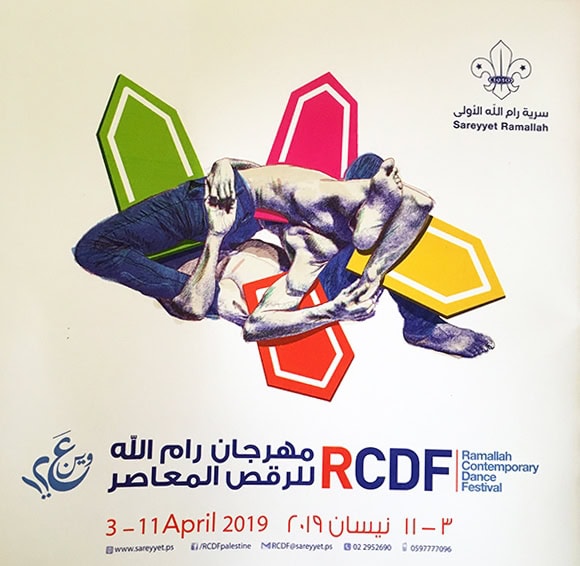Ramallah Contemporary Dance Festival
Posted: April 18th, 2019 | Author: Nicholas Minns | Filed under: Festival | Tags: British Council, Collectif Nafass, Khaled Elayyan, Nicholas Rowe, Nidal Abdo, Raising Dust, Ramallah Contemporary Dance Festival | Comments Off on Ramallah Contemporary Dance FestivalRamallah Contemporary Dance Festival, Ramallah, April 2019

The idea of attending the Ramallah Contemporary Dance Festival was inspired by a British Council callout to bloggers. I applied to write about a dance festival of which I had never heard that took place in what I thought to be a conflict zone in Palestine. What kind of dance might emerge under such circumstances, and what kind of spirit was behind the organization of such a festival were two questions I was keen to explore. As a precaution before applying I contacted the director, Khaled Elayyan, and learned this international festival is now in its 14th edition and is steadily building its reputation with performances from Australia, Estonia, France, Greece, Norway, Switzerland, Tunisia and the UK as well as hosting a roster of international dance producers, festival directors, and curators as speakers and guests. I was also happy to see Luca Silvestrini’s Border Tales was on the program; the idea of a festival in Palestine programming a work about borders when its own borders are controlled and being constantly eroded by an occupying state intrigued me. Art, as Gilles Deleuze breathlessly intoned, is inherently a form of resistance.
Although my British Council application to attend the festival was not successful, two weeks later Elayyan very kindly invited me to attend as a guest for the first week that would include the inaugural Palestinian Dance Forum connecting artists and guests, a symposium on the subject of the The Body in the Arab World as well as several workshops, indoor and outdoor performances. The experience proved every bit as rewarding as I had hoped.
You can only arrive in Palestine with the permission of the state of Israel, either through passport control on the Israeli side or at checkpoint on the bridge from Jordan. If you happen to be a curator of Arab dance living outside Palestine and your passport betrays an interest in countries like Syria, Lebanon or Iran such permission may be difficult to come by and if any dancer happens to be have been born in these countries and is now living in Europe, the chances of participating in the festival are nil. Nidal Abdo, a dancer and choreographer who was born in a refugee camp in Syria was only able to enter Palestine because he travels on a Ukrainian passport, but his company of dancers, Collectif Nafass — all Syrian refugees living in Europe — was denied permission to participate in the festival. Abdo had to make his ensemble work, What If Tomorrow…a solo instead.
Despite or perhaps because of the obstacles in its path, Ramallah Contemporary Dance Festival’s slogan this year, ‘Where To?’, is a question the brochure defines as addressing ‘our national, social, economic, cultural and educational fate and future…in light of a harsh and difficult socio-political and economic reality.’ There is no immediate answer to the question; it will transpire only through the collective endeavours of those organizing, supporting and attending the festival.
Rooted in Sareyyet Ramallah, an NGO that has a lineage from its early days in scouting, the festival is a flowering of the indigenous development of sport and dabkeh, the traditional form of folk dance. Sareyyet Ramallah today comprises three dance companies, a dance school, rehearsal studios, a swimming pool, a basketball court and a restaurant on a discreet but thriving campus just south of the city centre. The introduction of a contemporary dance workshop into the curriculum came about in 1998 through the suggestion of Australian dancer Nicholas Rowe who spent some years in the region and subsequently wrote a book about the history of dance in Palestine, Raising Dust. Rowe’s initiative led in 2005 — right after the end of the second Intifada — to a performance of At The Checkpoint by the Sareyyet Contemporary Dance Company, which toured throughout Palestine and in France, and then to setting up the first contemporary dance festival in 2006 in the same month Hamas won the national elections. It was not a propitious time for dance — Hamas felt the festival was too western and wanted to stop it — but that year there were five companies from Belgium, France, Benin, Spain, and Ireland as well as the Sareyyet company performing At The Checkpoint. It proved a great success and after 14 years, as Elayyan grins, the public is getting used to contemporary dance, enjoying a range of works over the years by the likes of William Forsythe, Akram Khan, Sasha Waltz, Maguy Marin, Russell Maliphant, Candoco, Stopgap and Protein Dance. It’s a remarkable achievement that continues to expand with a network in Jordan, Lebanon and Syria. Contemporary dance is presenting Palestine and the Arab world in terms of international cultural exchange that eloquently counters the region’s noxious political climate.